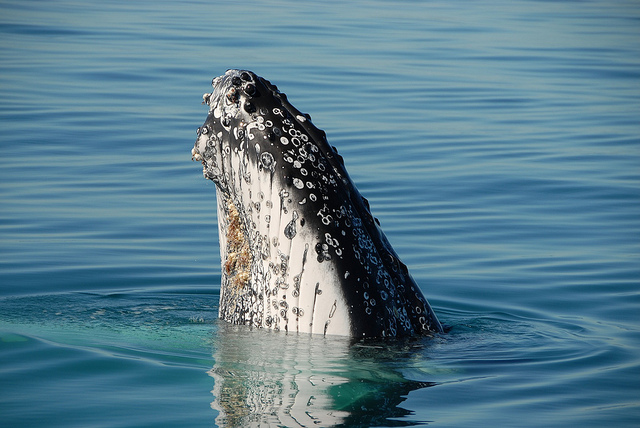
Did you know whales can talk? It’s true — whale songs and vocalization can be heard in the depths of the world’s oceans. But why do whales sing songs?
It’s a matter of perception. Sight is not as effective because of the way light scatters in water, and smell, even more difficult to sense under water, where particles diffuse at a much slower rate. So whales and dolphins adapted to make use of hearing, since sound travels about four times faster in the water than on land at sea level.
What are whale songs?
Many dolphins use echolocation to navigate and stalk their prey. Yet, these sounds are also used by the humpback whales in songs.
That is, whales sometimes sing using a series of vocalizations when they reach a specific area of the ocean. After a group leaves this area, they often return and pick the song back up by staring right where they left off. Whale songs are sounded beneath the water at a frequency between 10 Hz to 31 kHz.
The songs are composed of phrases made of four to six units (units – number of times the frequency being modified). This is then repeated for two to four minutes — to make a theme. A collection of these themes makes a whale song. The pace and volume of the song may also change.
What makes whale songs so interesting is that the whales that live in a specific geographical location tend to sing the same songs. Scientists consider that whale songs serve echolocative purposes or stand-alone sounds may also aid in mating practices. Whales use their songs to flirt!
How do humans disrupt whale communications?
Even if these whales vocalize and identify a place through the sounding of a song, most of us go about our lives totally unaware to the intelligence of the blue whales.
That is why in recent times, human activities and technologies disrupt the harmony of whale songs.
The presence of noise pollution in ships, seismic surveys, and sonar disturbs the hearing and vocalization of the whales and dolphins. These marine species are much more sensitive to sound, since they adapted to use echolocation and hearing for survival and even socialization.
Dr. Christopher Clark of Cornell University used the US Navy’s military technology to listen for whale songs. After observing the sounds resonating throughout the oceans, Clark discovered that whale songs travel through the water for thousands of miles. He tracked the songs of whales off the coast of Ireland all the way back at his base location in Puerto Rico.
Today, many of the whales have begun to sound at lower frequencies to avoid the noise clutter in the oceans. It is thought that whales could once communicate at much greater distances across the world’s oceans, but the shipping pollution has now disrupted the acoustics of the whales’ natural habitat.
It seems so easy to overlook the intelligence of nature, but whale songs are recalled and sounded through memory.
Humans tend to overlook the most curious things about the planet. For instance, why were there an extraordinary number of flowering plants in the UK over the winter?
⚕Home⚕
Photo by Shafi, Blue Dolphin Marine Tours, Inforgraphic via Oceans Initiative






